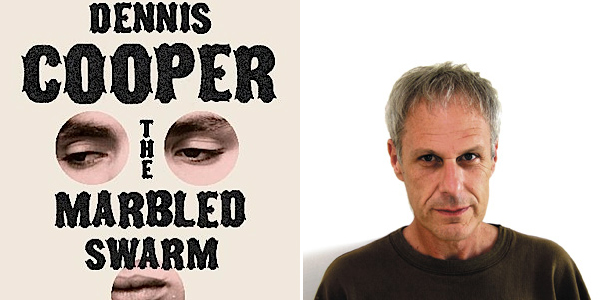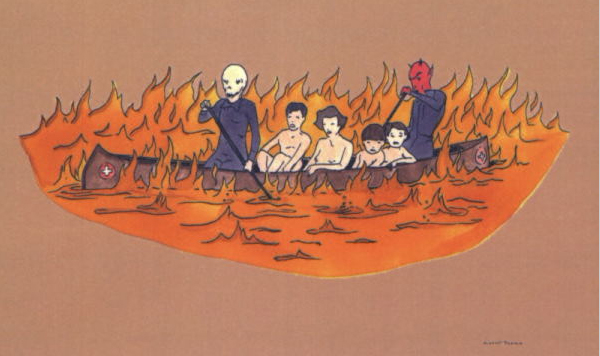Street-Side, Bedside, Broadside: An Interview With Shannon Cain
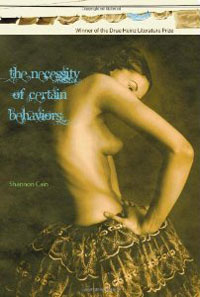 The Necessity of Certain Behaviors
The Necessity of Certain Behaviors
by Shannon Cain
University of Pittsburgh Press, 2011
160 pages / $24.95 Buy from Amazon
Stories in Shannon Cain’s The Necessity of Certain Behaviors pair exhibitionist events and their three-ring tableaus with characters who typify “marginal,” yet who nonetheless surprisingly assert not only their outsider status, often in correlation with their sexualities, but also their complexities—a young lesbian ventures to the set of The Price is Right to meet her father, Bob Barker, only to find not parental but sexual identities challenged; a mayor’s wife endures the scandalizing of her sexuality after she is caught masturbating in the YMCA’s shower room, only to find that her new relegation to sexual deviant has allowed her singular insight into victims of the myriad sexual minefields in her community—the cumulative effect of these stories also achieves a reversal: common notions of taboo or freakishness gain warmth and humanity, while the normative culture unveils its crippling deformities. Cultural critique couldn’t have a more compelling and sophisticated face. In an era often favoring equivocation as a substitute for vision, this collection is clear: take a stand, make it compassionate. Others agree, of interest to note: American Literary Review, American Short Fiction, Colorado Review, Massachusetts Review, Southwards, Tin House, The O. Henry and Pushcart Prizes, the National Endowment for the Arts, and The Drue Heinz Literature Prize.
January 20th, 2012 / 12:00 pm
Sean Kilpatrick’s fuckscapes
This is a book you need. Language reset. Guidebook.
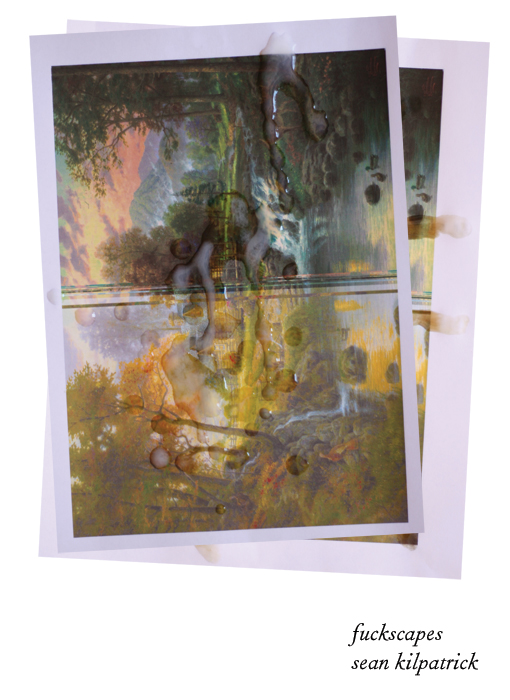
“The violent, sexual zone of television and entertainment is made to saturate that safe-haven, the American Family. The result is a zone of violent ambience, a ‘fuckscape’: where every object or word can be made to do horrific acts. As when torturers use banal objects on its victims, it is the most banal objects that become the most horrific (and hilarious) in Sean Kilpatrick’s brilliant first book.” – Johannes Goransson, author of A New Quarantine Will Take My Place
“Pregnancy dream of poetry has this Sean Kilpatrick book by the fist. You learn to signal to others from the woken state, here, line-by-line. Do you have any extra money? Buy this book! If you have to skip lunch, buy THIS BOOK! “I held my breath so hard I ended up in the country.” Some poetry you read is forgotten, and never remembered. Some poetry, this poetry, Sean Kilpatrick’s poetry, is a manual for exciting the engine to throw you out of the vanquished pleasures. Here is your I.V. drip of sphinx’s blood.” – CAConrad, author of The Book of Frank
Leigh Stein Interview (5)
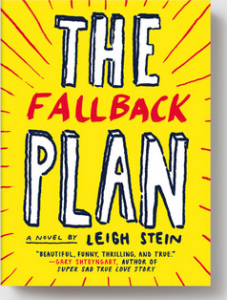 Leigh Stein’s yellow first novel, The Fallback Plan, is about a girl named Esther who has a degree in acting but has just been coasting since graduation, trying to adjust to a newer, sadder understanding of how the world works. “It was unfair that life was so irrevocable, that nothing could be frozen in time or retracted” she thinks in the final chapter called, appropriately, “Independence Day.” “I loved acting because it was like living inside of a fixed amount of time, looped from start to finish. In rehearsal, I went through the best and worst moments of some woman’s life, again and again, until I’d perfected them.” Now, feeling like a stranger in her parents’ backyard, she sits in the distance and watches the lives of the people around her and it seems like she resolves, at last, to take the long way through her own life. I asked Leigh about that for my last question in this week-long interview (see parts one, two, three and four). READ MORE >
Leigh Stein’s yellow first novel, The Fallback Plan, is about a girl named Esther who has a degree in acting but has just been coasting since graduation, trying to adjust to a newer, sadder understanding of how the world works. “It was unfair that life was so irrevocable, that nothing could be frozen in time or retracted” she thinks in the final chapter called, appropriately, “Independence Day.” “I loved acting because it was like living inside of a fixed amount of time, looped from start to finish. In rehearsal, I went through the best and worst moments of some woman’s life, again and again, until I’d perfected them.” Now, feeling like a stranger in her parents’ backyard, she sits in the distance and watches the lives of the people around her and it seems like she resolves, at last, to take the long way through her own life. I asked Leigh about that for my last question in this week-long interview (see parts one, two, three and four). READ MORE >
Interview with Leigh Stein (3 and 4)
 Leigh Stein’s meaningful first novel, The Fallback Plan, is about a girl named Esther who has just graduated from college and is feeling aimless and depressed, which, okay, sounds like a well-visited premise for a novel. But Esther is so witty and likable that you can’t help enjoying her mild misadventures. I’ve been emailing a question to Leigh every day this week, but yesterday she was caught up on her book tour (is she in your town?), so here are two questions
Leigh Stein’s meaningful first novel, The Fallback Plan, is about a girl named Esther who has just graduated from college and is feeling aimless and depressed, which, okay, sounds like a well-visited premise for a novel. But Esther is so witty and likable that you can’t help enjoying her mild misadventures. I’ve been emailing a question to Leigh every day this week, but yesterday she was caught up on her book tour (is she in your town?), so here are two questions
HTMLGIANT: Can I tell you something? Why is the novel so funny? Or, seriously, what was the writing process like? How many revisions did it take to get all the jokes in there? Like, “A small part of me threw up.” Or making a confused facial expression to trick the IPASS sensor, or a mom with a “hairstyle most conducive to storing pencils” instead of one who says “well look at that” when you show her how to enlarge the type in MS Word.
LEIGH: Esther makes jokes as a way of pricking the bubble of despair and stagnation she lives in, because that’s what I do. READ MORE >
Interview with Leigh Stein (2)
 Leigh Stein’s laugh-out-loud-funny first novel, The Fallback Plan, is about a girl named Esther who has just graduated from college and, for lack of anything better to do, takes a job babysitting for a girl named May, whose parents, Nate and Amy, lost their first child a few years before. Bored, Esther spends a lot of time imagining a Chronicles of Narnia redux, featuring panda bears.
Leigh Stein’s laugh-out-loud-funny first novel, The Fallback Plan, is about a girl named Esther who has just graduated from college and, for lack of anything better to do, takes a job babysitting for a girl named May, whose parents, Nate and Amy, lost their first child a few years before. Bored, Esther spends a lot of time imagining a Chronicles of Narnia redux, featuring panda bears.
HTMLGIANT: One thing I am thinking about writing about it is about doors. The Fallback Plan has some good ones — the door to the dead child’s room, the door to the studio, the panda’s doorway to the other world, the father’s security concerns, the throwing of keys, and the whole book represents Esther’s passage into adulthood. Was there anything intentional you were thinking about the doors when you were writing this?
Leigh: I wasn’t thinking intentionally about doors…I wish I was! That would make me seem so smart. One thing I do sometimes to test my memory is try to remember doorknobs. Like in the house I lived in until I was 13 or 14, the doorknobs were very particular (inspiring the doorknob to the attic in my novel) and by remembering them, I feel like I still hold on to a little piece of that house.
Interview with Leigh Stein, who wrote The Fallback Plan
 Leigh Stein’s laugh-out-loud-funny first novel, The Fallback Plan, is about a girl named Esther who has just graduated from college and, for lack of anything better to do, moves in with her parents. She takes a job babysitting for a girl named May, and she has a tepid affair with May’s father. She also has a crush on a guy named Jack, and they have sex, and right before they do it Esther tries to think about something sexy, so she thinks about a Winnebago. It’s with that in mind that I asked Leigh Stein to do this interview. I only had one question.
Leigh Stein’s laugh-out-loud-funny first novel, The Fallback Plan, is about a girl named Esther who has just graduated from college and, for lack of anything better to do, moves in with her parents. She takes a job babysitting for a girl named May, and she has a tepid affair with May’s father. She also has a crush on a guy named Jack, and they have sex, and right before they do it Esther tries to think about something sexy, so she thinks about a Winnebago. It’s with that in mind that I asked Leigh Stein to do this interview. I only had one question.
Me: Wait, are Winnebagos sexy?
Leigh: Winnebagos are sexy for the following reasons:
1. They suggest adventure, the romance of the open road, Americana.
2. You could say “Let’s run away!” to your loved one, and then actually do it in one of these.
3. A bed + a motor vehicle = sexy.
I can’t recommend this novel, and this manner of thinking, any more highly than I already do.
My fear arouses me: an interview with Dennis Cooper
The odds are decent that you know Dennis Cooper better than I do. After hearing about his work for years and constantly promising myself that I would try a little someday, I found myself graduated from the MFA program with time to read books of my own choosing again, and so I finally started reading his novels, and I haven’t stopped in the few months since. You’ve already read in this space about his latest book, The Marbled Swarm, a ludicrously powerful book that you really need. After reading The Marbled Swarm I had to send him some painfully earnest fan mail, and he received this note with a grace and generosity that will surprise no one who has read his blog. I asked if I could interview him. He said yes. His answers are more than worth your time; the book demands it.
So I had a really frustrating experience buying The Marbled Swarm at a local independent bookstore. I saw that they had two copies of Blake Butler’s There Is No Year shelved where you would expect, and I figured it would be easy from there because a) you share a press and b) “Butler” is alphabetically pretty close to “Cooper.” After a long search, I had to go ask one of the bookstore employees. She said that your book was supposed to be shelved in gay fiction, with a question mark at the end of her statement. (I was there with my wife; the employee seemed skeptical that I would want a book from the gay fiction section. I was sort of furious about that whole interaction.) And it was there! Do you like being shelved under the category of gay fiction? Do you think it’s been helpful for your work, commercially or otherwise?
I’m always surprised and disappointed when my books are cordoned off like that. I can’t speak to the reasons why that store in particular shelved The Marbled Swarm there, obviously, but, in general, I think it’s the result of a longstanding habit.
When I published my first couple of novels in the late 80s and early 90s, there was this vogue among critics and publishers regarding the notion of ‘gay literature’. I think that was the point where literary arbiters first cottoned onto the idea that there was a historical trajectory involving the work of authors who happened to be gay that had been largely unexplored and was ripe for a thinkfest. Also, there was apparently a decent sized gay male readership of fiction at that time. I remember people in the publishing industry saying that any gay-themed novel was pretty much guaranteed to sell around 5000 copies, so quite a number of writers who happened to be gay were being swept up by major publishers and given small advances based on the logic that the books would at least earn back if not even make everyone involved a bit of money. I’m not sure if that was actually true or not. READ MORE >
The Soul Transformative Experience of Writing Itself: An Interview with Ryan Boudinot
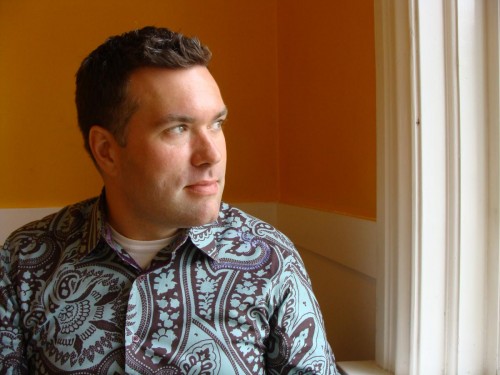
Massive Novel Alert: Today marks the official release of Ryan Boudinot’s massive (in all senses of the word[seriously—it’s going to create a gravity well]) new novel Blueprints of the Afterlife(Grove 2012). I got a chance to read this early on. I like Ryan’s work. I like Ryan. Ryan’s a solid citizen of literature in Seattle. And everywhere. I figured I would like the book.
I didn’t figure it would be as expansive, as imaginative, as powerful, and as quaking as it it.
Seriously. It’s awesome. Take a look. Here’s a sample chapter.
Over the next few days, I’ll be posting some Boudinot appreciations and a round-up. (And if anyone reading has something they’d like to add, feel free to get in touch with me @ giantblinditems @ gmail dot com.) Today, though, we begin with a long interview with the author.
***
You’ve written flash stories, short stories, a short novel, and a really long novel. Do you have a length at which you feel most comfortable?
You’re really wanting me to start this interview with a penis joke, aren’t you?
Heh. For the record, I think that no matter what is said in this email chain, we should use it in the interview. So, that line. And this caveat. We should just use everything said in here.
So, yes. READ MORE >

